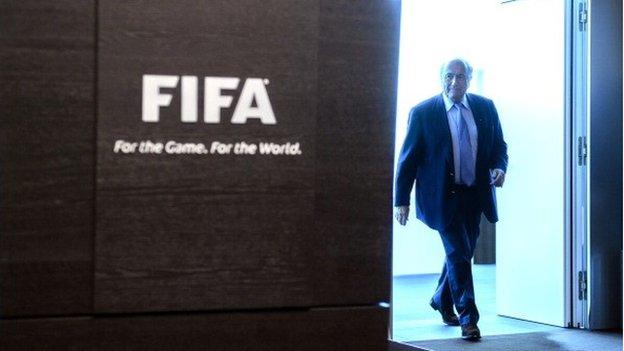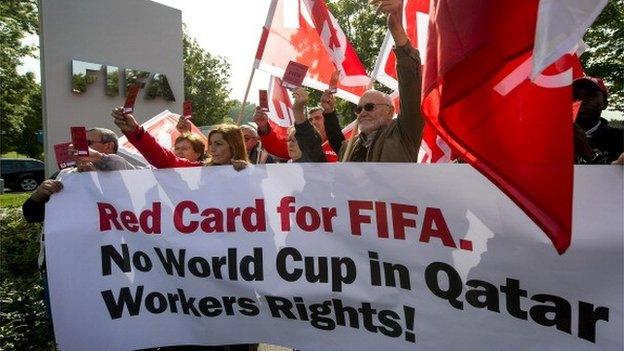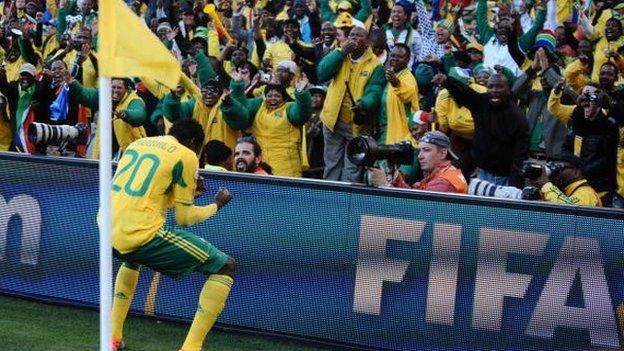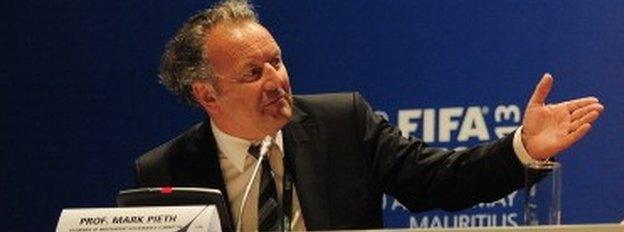Fifa 'must show red card to dated line-up'
- Published

Heading for the exit: Sepp Blatter has announced he is to stand down as Fifa President
No sooner has Sepp Blatter said he is heading for the exit door at Fifa's plush headquarters in Zurich, than urgent questions are being asked about how football's tarnished governing body should reinvent itself.
The jet-set "pseudo-corporate" lifestyle of Fifa executive committee members has long been a wonder to fans and media alike, but the trappings of an international corporation have unfortunately not come with the sort of oversight that a true business organisation should possess.
Mr Blatter's decision to go later this year or early next year, after a continuing investigation by US authorities into allegations of corruption at Fifa is only the first of many steps that need to be taken, according its critics.
'Lack of transparency'
"Their current governance model is not fit for purpose," Oliver Parry, senior corporate governance partner at the UK-based business body the Institute of Directors, told the BBC website.
"It is not clear, transparent, or open, and people on the outside looking in do not have an understanding of how decisions are reached. There is a complete lack of transparency.
"Bringing in a new man, or woman, is not going to change the problem. There needs to be a root-and-branch re-organisation."

The controversy over the Fifa executive's decision to give the 2022 World Cup to Qatar continues
Fifa's centre of power is its executive committee , external (ExCo), and the fact that this small body of 24 people (one President, eight Vice-Presidents and 15 members) has such power over global football is a concern for many.
Members are appointed for a four year term, from among the six continental Confederations (eg Uefa in Europe) and 209 national football associations around the world.
The ExCo meets at least twice a year and among its major powers is determining the dates, locations and format of tournaments, including of course the World Cup.
It is this particular function which has aroused so much controversy - over the awards of the 2010 (South Africa), 2018 (Russia), and 2022 (Qatar) World Cups.
Mr Parry says - using good corporate practice as a guide - there are three main changes that the IoD would like to see Fifa make:
Transform its executive committee into a modern board of directors, containing a significant number of independent board members directly elected by the Fifa Congress
Replace the role of president with two separate positions of chairman and chief executive, as is the norm for large multinational organisations
Undertake a wide-ranging review of Fifa's key processes and policies, including those relating to World Cup hosting decisions.
'Beacon for sport'
"This is a massive juncture for Fifa," says Mr Parry. "If they get things right now, they have the chance to make a really positive change to world football for decades to come.
"If they have the appetite and desire, then they have the opportunity to become a beacon for other sports around the world."

There are questions now being asked about how South Africa was awarded the 2010 World Cup
Making sure the executive is held to account over its decisions will be key.
Simon Chadwick, who is professor of sport business strategy and marketing at Coventry University Business School, says a reformed Fifa must have clear and published governance rules in place.
He agrees there must be a division of powers within Fifa, with a separate board and executive, and says it is crucial that "those making the executive decisions should be separate from the people responsible for holding the financial purse strings".
In addition Prof Chadwick believes that the membership of any new executive body should be widened "to include not just members of football associations, but also fan representatives, sponsor representatives and other stakeholders".
Sponsors, who invest millions in supporting Fifa events, have a particular interest in seeing that the sport they are backing is run cleanly, as association with a murkily-run organisation can easily tarnish a corporate reputation.


Fifa's previous attempts at governance reform
In 2011 an independent governance committee (IGC) was set up by Sepp Blatter, overseen by Mark Pieth, a professor of criminal law at Basel University.
Prof Pieth's team issued a final report in April 2014.
He said then that progress had been made on key areas, but called for further changes.
"The problem is not, or was not, Blatter alone. It's the structure - it's systemic in this institution," he said on Wednesday, the day after Mr Blatter announced his resignation.
Prof Pieth proposes a public body, or Fifa's host state Switzerland, should take responsibility for the organisation.

'First step'
As well as corporate change there are also calls for Fifa to show it can be run on a more ethical basis.
Andre Spicer, professor at Cass Business School in London, said the news that Sepp Blatter was standing down was just the beginning of the task ahead.

"When morally tarnished leaders head for the exit, people think the job is done," he said.
How Fifa makes and spends its money
"The departure of a high-profile leader who has overseen ethical failures is often celebrated - people think a change at the top is the most important indication an organisation is changing. In reality, it is only the very first step in what is likely to be an ultra-marathon of ethical improvement.
"Old leaders are often treated as a scapegoats; by getting rid of them, there is an irrational hope the organisation can erase all past sins. Sadly, the world is not like that. It is relatively easy to change the tone from the top, but cleaning up the mess in the middle is the hard part.
"As Fifa seeks to reform itself, it will find a change at the top is only 10% of the solution. The other 90% will take years to achieve - if it can in fact ever be achieved."